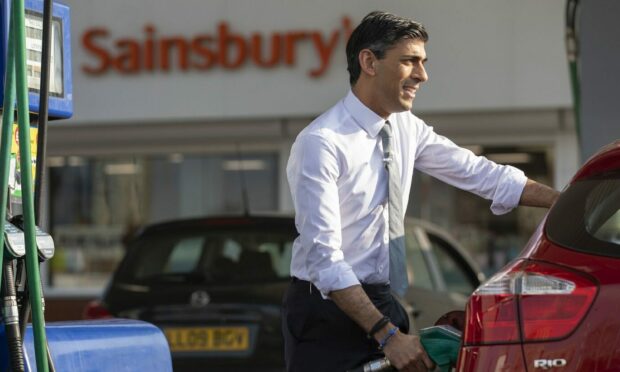The chancellor’s spring budget has been slated by money saving expert Martin Lewis and dubbed “irresponsible” by a leading poverty charity.
The tough verdict comes one day after Chancellor Rishi Sunak promised to slash taxes for millions of people in a cost of living crisis.
Some of the announcements in his spring statement include cutting fuel duty by 5p for a year, increasing the threshold for national insurance, cutting income tax and doubling the household support fund.
Despite these promises, taxes will rise to their highest levels since the late 1940s.
Financial experts are now warning the chancellor’s spring statement will leave many “destitute” and having to go without food and other basics like soap.
National Insurance change ‘won’t help workers’
Prior to the budget it was announced national insurance contributions will increase by 1.25 percentage points from April this year to help pay for health and social care services.
In a bid to offset this, the chancellor said threshold at which people start paying national insurance contributions will be raised to £12,570 from July.
Currently the threshold is only £9,880.
The chancellor says this will benefit 30 million working people, including 2.4m in Scotland.
It should mean 70% of taxpayers pay less national insurance and the typical employee saves more than £330 a year.
However, money saving expert Martin Lewis calculates this will not actually affect anyone earning between £9,600 and £35,000, and those earning more than this will end up paying more.
My instant instinctive, response and what it means for you off back the of the Spring Statement pic.twitter.com/uAyyID4Q78
— Martin Lewis (@MartinSLewis) March 23, 2022
The Institute for Fiscal Studies has also criticised the decision, saying it will benefit pensioners and those on benefits at the expense of workers.
Does income tax change apply in Scotland?
One of the other big announcements was reducing the basic rate of income tax in England, Wales and Northern Ireland to 19% by April 2024.
As income tax is devolved to Scotland, this will not apply.
In Scotland, those on the lowest incomes already have an income tax rate of 19%.
Anyone earning more than £14,667 a year will continue to be taxed 20% or more.
The chancellor’s statement on income tax will also mean the Scottish Government recieves an additional £350m from Westminster in 2023, which MSPs will be free to decide what to do with.
The Fraser of Allander Institute at Strathclyde University criticised the decision.
The group said it has been made to appeal to voters at the next election rather than to help those most in need.
An institute spokesperson said: “Rishi Sunak is rapidly repainting the image he carved for himself during the pandemic.
“Gone is the priority to ‘do whatever it takes’.
“It is replaced by a reiteration of his desire to meet his own fiscal rules, whilst pencilling in a flagship cut to income tax.
“The political calculation is that the promise of tax cuts and fiscal prudence will appeal to the core elements of the electoral base.
“But this may yet prove a risky strategy.
“In the meantime, 2022 is set to be an extremely tough year for many households.”
Who are the winners and losers?
It is hard to see many winners in the spring statement.
Drivers will benefit from a reduction in fuel duty of 5p, but motoring groups such as the RAC warned it might be a drop in the ocean.
Paul Johnson, director of the Institute for Fiscal Studies, said working people and those relying on benefits will be hit hard by the decisions.
He said: “His choice to increase national insurance rates and reduce the basic rate of income tax looks indefensible from an economic point of view, though one can see the political attractions.
“He continues, despite his rhetoric, to be a chancellor presiding over a very big increase in the tax burden.
“He is sharing the inevitable pain of continued bad news between public services and taxpayers, with benefit recipients suffering in the short term.
“He had tough decisions to make – other choices were available.”
Lower incomes hit hard
Anti-poverty campaigners said the chancellor’s spring statement will leave those on the lowest incomes without food and other essentials like soap – and may even kill some people.
Jack Monroe, who writes budget-friendly cookbooks and is due to meet the prime minister on Thursday 24 March, said: “Building a stronger economy – funny that they never tell you exactly on whose backs and spirits they’ll break to lay the bricks of it.
What kind of Government can be repeatedly presented with evidence, from courts, coroners, charities, med professionals, that their swingeing cuts to all the support for the most vulnerable are KILLING PEOPLE, and decides to respond by serving up more of the same, but worse still?
— Jack Monroe ♿️🏳️⚧️🏳️🌈 (@BootstrapCook) March 23, 2022
“What kind of government can be repeatedly presented with evidence from courts, coroners, charities [and] medical professionals that their swingeing cuts to all the support for the most vulnerable are killing people, and decides to respond by serving up more of the same, but worse still?”
The Joseph Rowntree Foundation also warns many will fall into destitution.
Dave Innes, the charity’s head of economics, said: “Security is only real if it’s for everyone – the choices the chancellor has made today won’t deliver any security for those at the sharpest end of this crisis.
“Instead he has abandoned many to the threat of destitution.
This is what "balancing the budget on the backs of hte poor" looks like. pic.twitter.com/otZzgkUAKP
— Jonathan Portes (@jdportes) March 23, 2022
“The chancellor has acted recklessly in pressing ahead with a second real-terms cuts to benefits in six months, while prioritising people on middle and higher incomes.”
He warned the proposed changes to national insurance will not help anyone who is out of work.
Mr Innes added: “The chancellor has asked us to judge hum on his actions over the past two years, and while some of his previous choices have helped the worst off, he now risks plunging many into destitution.
“Make no mistake – this dire situation will leave millions in despair as a direct consequence of the chancellor’s irresponsible choices.”

